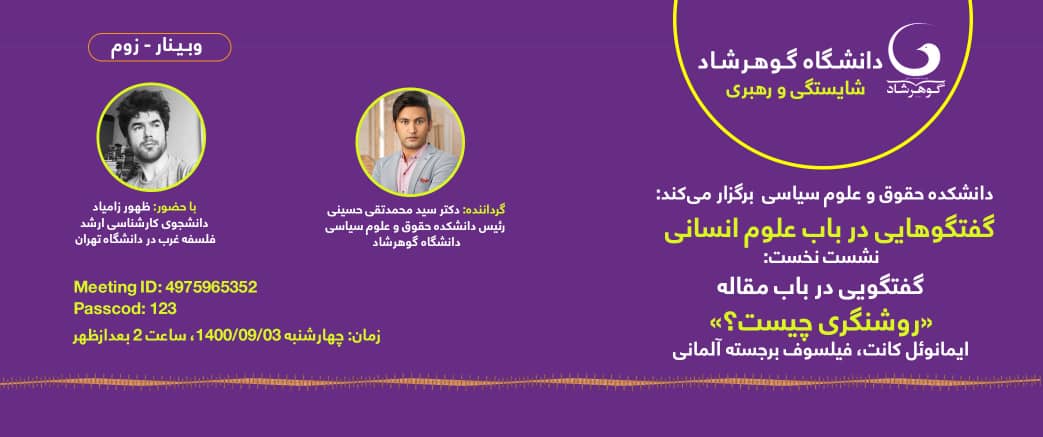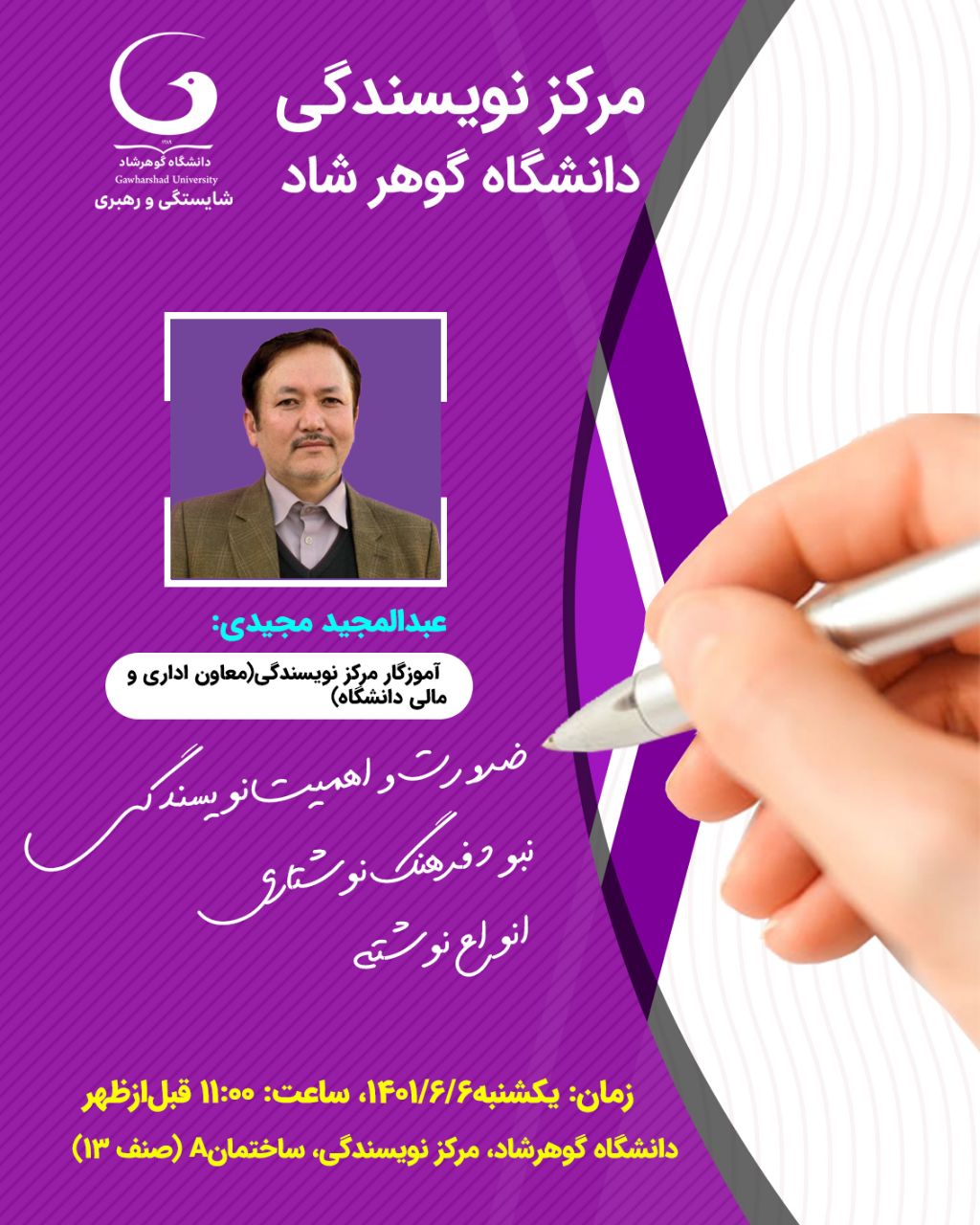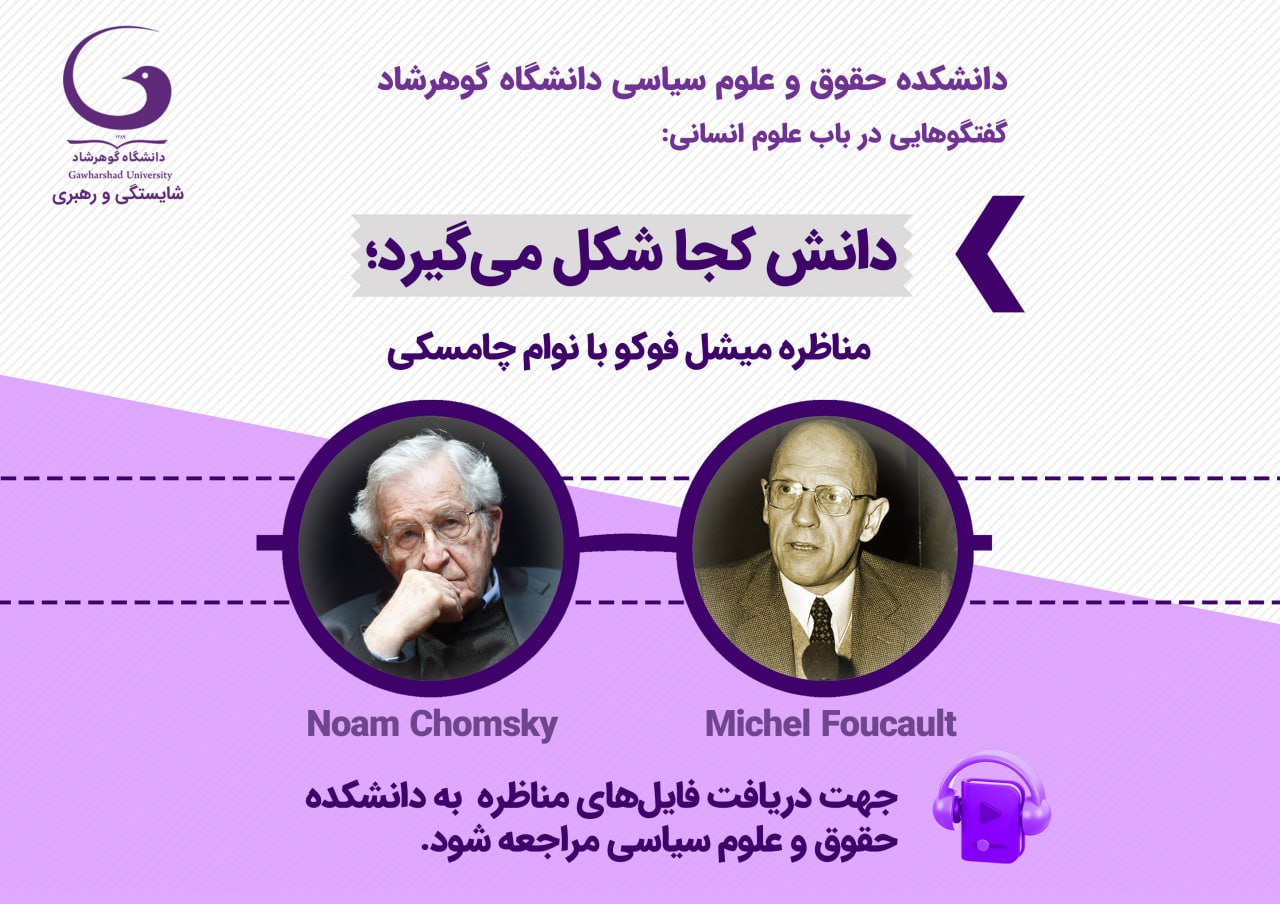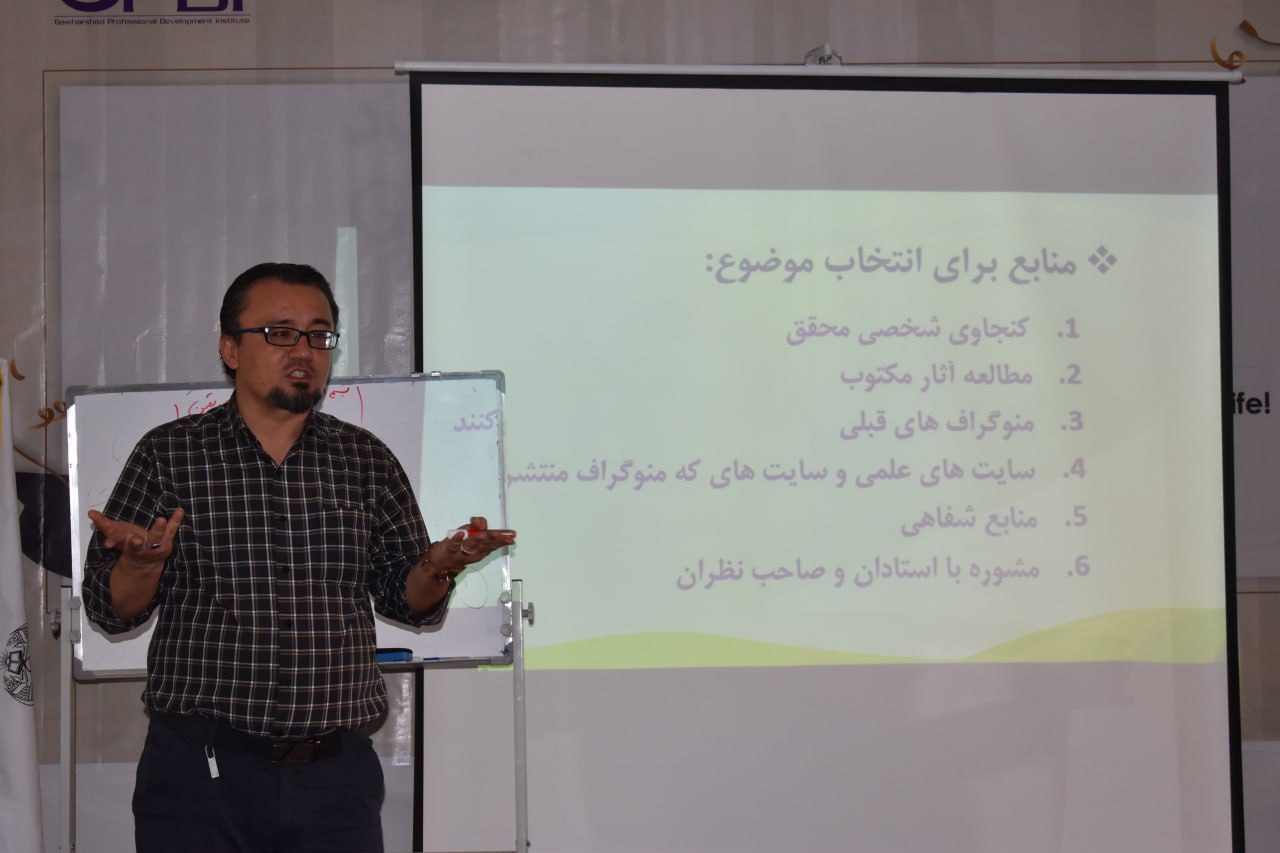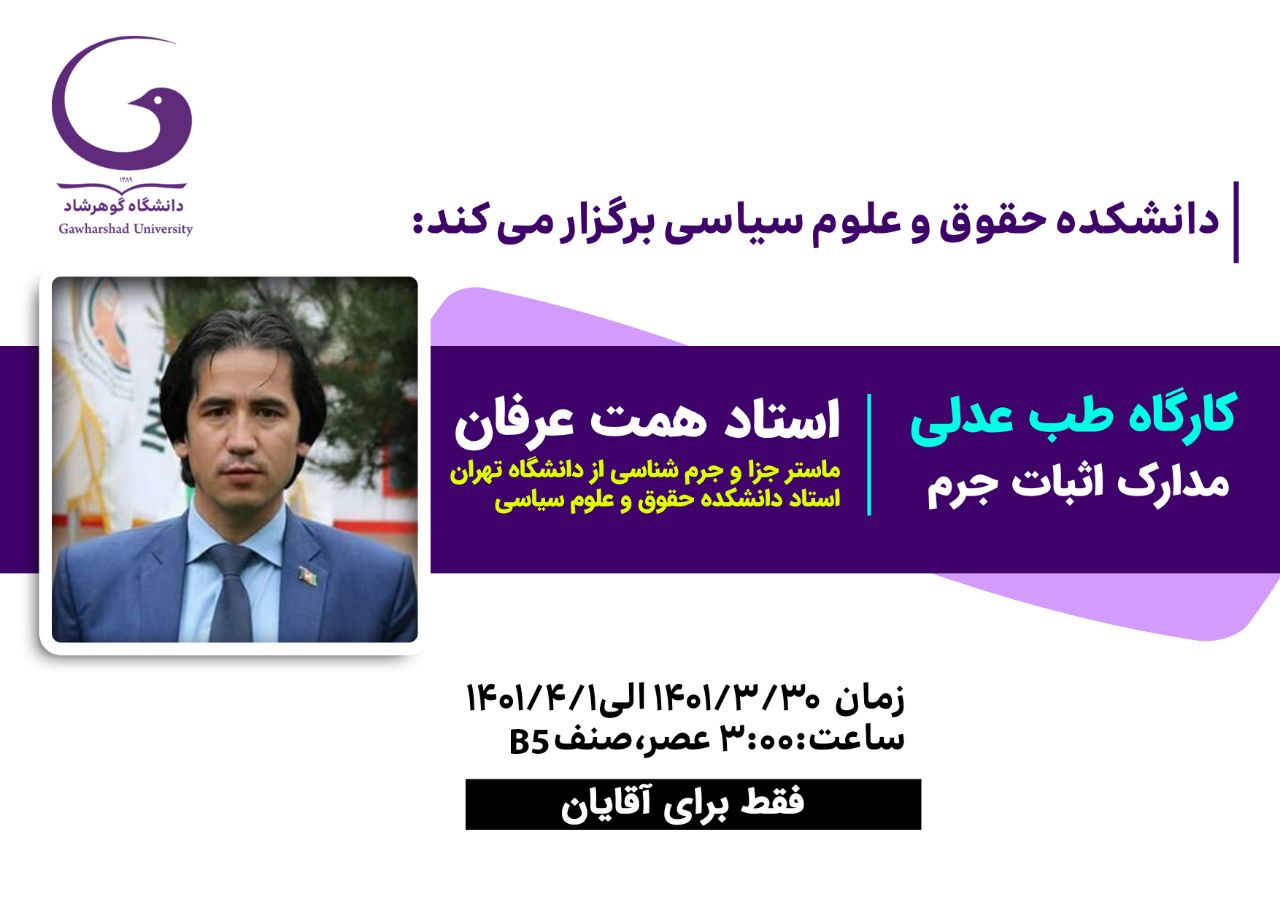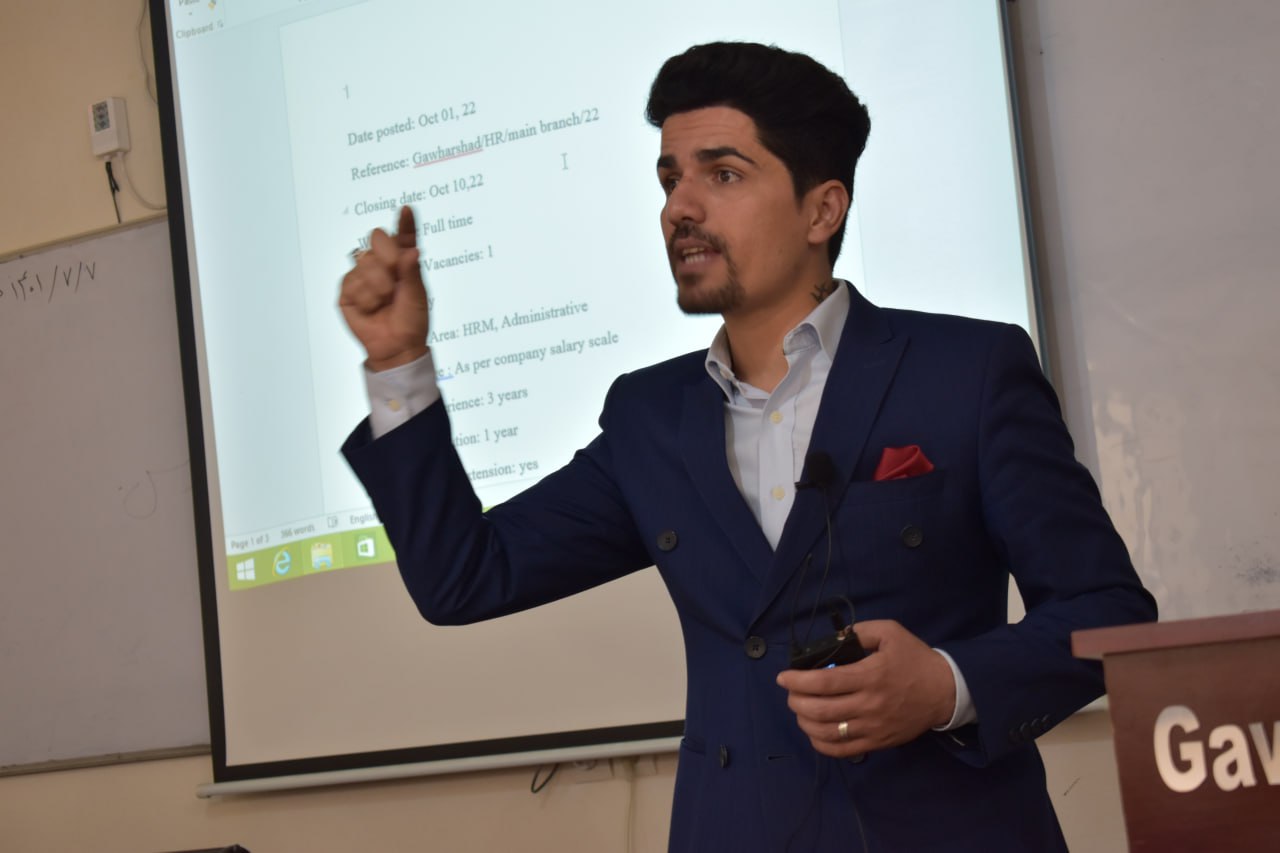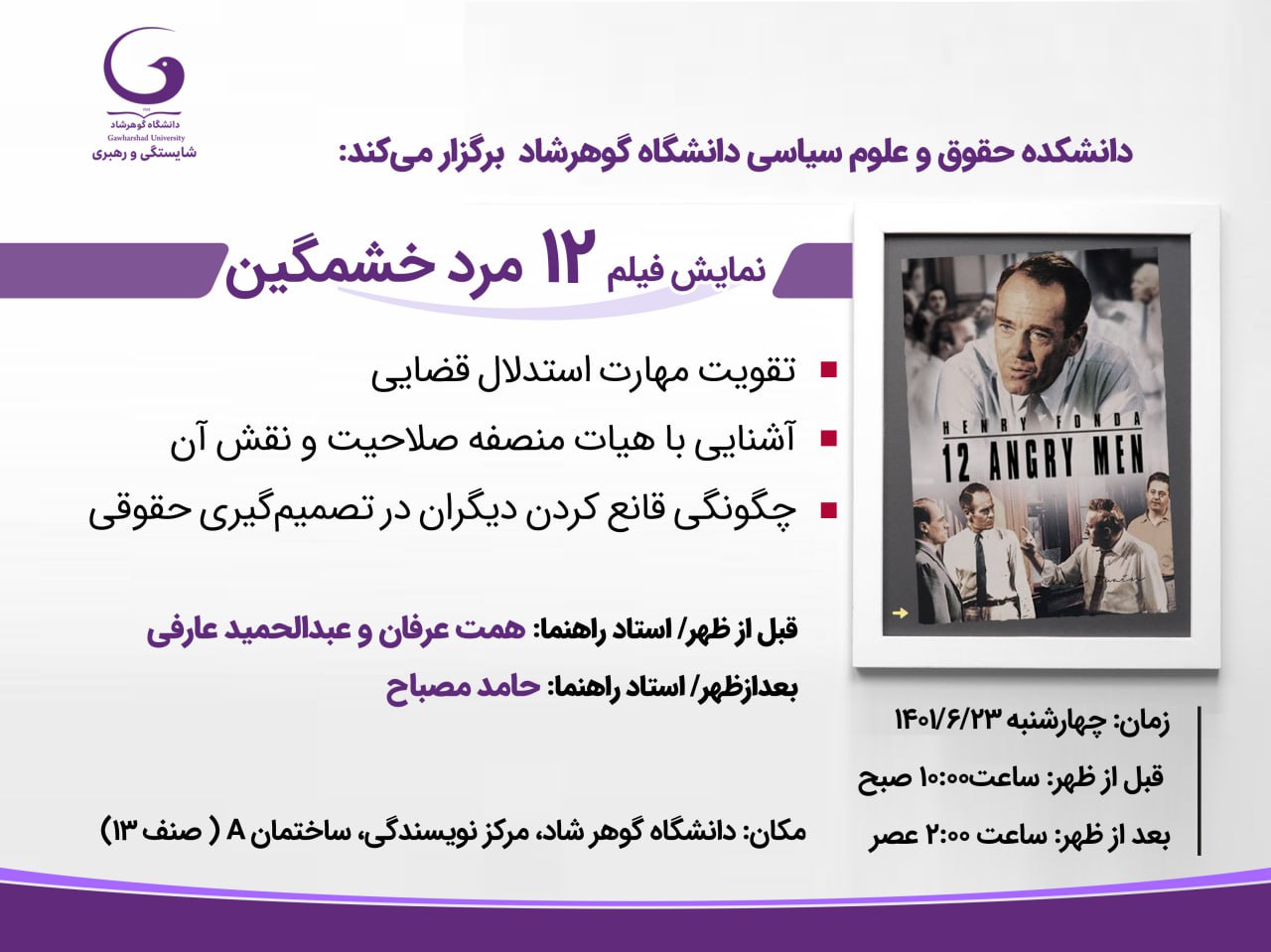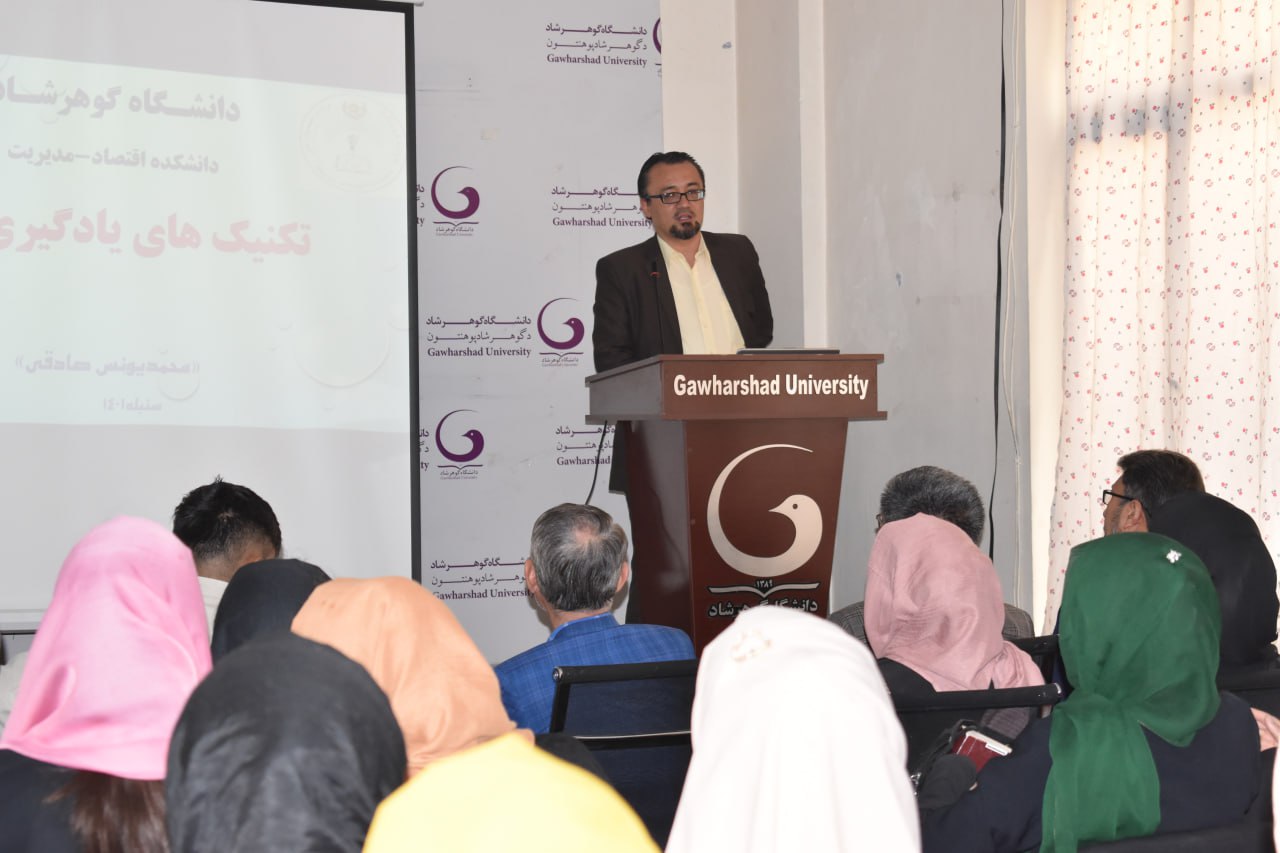All News
In the third session of the Conversations on Humanities series, we were honored to host Mr. Esmaeetollah Kazhazad, a master's student in Western Philosophy at the University of Tehran. He emphasized the importance of awareness in his discussion. According to Hegel, an idealistic and historicist German philosopher, in his influential work "Phenomenology of Spirit," he dedicated a chapter to "The Dissatisfaction of Consciousness." Consciousness, as a fundamental concept in German idealism, is often associated with dissatisfaction and suffering. Nietzsche also warned that awareness is intertwined with the deepest despair. But why? Why does dissatisfaction and pain resulting from awareness of existence find such a significant position within the philosophical system of idealism, especially among its prominent figures like Hegel? Idealism is a theoretical framework that aims to examine the world based on ideas about it rather than analyzing it as an object or a collection of objects. Idealism believes that the material world does not exist independently of the ideas one has about it in their mind. Therefore, "consciousness is the true foundation of reality," and it occupies a central position within this system.
What is Hegel's contribution to this story? What happens to the task of conscious dissatisfaction? Hegel, in the structure of the lofty and magnificent idealism, had a role; he said: unique ideas (or, to translate by Baqer Parham, "separate thoughts") can be combined and create an absolute idea. Hegel believed that not only is this possible and achievable, but it is also necessary; as Jean Wahl says, this methodology is related to the field of life, not just a method of pure speculation. Hegel insisted that we can truly know and understand a part of the dual world at that time and understand that we need to know and understand all of it. Hegel borrowed the concept of dialectic from Greece and Greek philosophy to reach a state where totality can be recognized and expanded. In the eyes of ancient philosophers like Socrates, dialectic was a method solely for exploring knowledge through a path full of questions and answers; as Tony Myers puts it, something similar to the famous game "20 Questions" where each question gets closer to the final answer through previous answers. We have often heard or read that Hegelian dialectic is a three-stage process. An initial thesis, first idea, or initiating proposition is proposed, then in an antithesis, it is criticized, modified, and ultimately negated. In the final step, these two are synthesized or blended into a more comprehensive idea; a process in which superior aspects are preserved while drawbacks and regressions are eliminated, resulting in an overall improvement. This image of Hegelian dialectic that we have heard or read everywhere is a common image in which different perspectives always have the ability to reconcile within a comprehensive truth and overcome obstacles; reconciliation of ideas and propositions is inherently what Walter Benjamin sees as the focal point in understanding Hegel.
But Hegel, as an influential and groundbreaking thinker, is more radical and uncompromising than this excellent and ordinary image of him and his ideas. The product of Hegelian dialectics is not reconciliation or agreement, but rather a deep understanding of the inherent contradiction in each thesis (or the ultimate divine unity).
(session two) were discussed. In this session, Dr. Seyed Hassan Akhlagh, a university professor in America and an expert in Western philosophy, was asked who the student is. They responded that just as the university is a new phenomenon, the student is also modern. The student is not like the old student who was eager for knowledge; rather, they are a present entity who believes that they can find their identity through university and be influential in society. In other words, they have a mission. The identity of the student is linked to the university, knowledge, and the modern world. Knowledge here refers to critical and modern approaches and engagement with societal realities. The student has changed from the time of Khwaja Nasiruddin's era, and today's student must be influential in society. Why hasn't the university gained prominence in Afghanistan? It is because universities were imported; they were not a natural element in Afghanistan and did not grow in suitable soil. Descartes discusses different sciences in the West first and considers philosophy as their root, stating that it is this philosophy that fosters these sciences. Therefore, trees do not grow in unsuitable and barren land. Universities in Afghanistan and similar countries have failed to align with their spirit; they have always focused on defending themselves and tried to prove that they are natural members of society. Syed Jamaluddin says in a speech at Calcutta City Hall: why has the university not yielded results in Islamic countries? Why does it act as an assembler and import Western-style knowledge but fail to produce results? His response is that we took universities from the West but did not take their atmosphere or environment. Universities grow within a philosophical space which does not exist in Islamic countries. In other words, universities are not at home there. Regarding Afghanistan, it must also be noted that education has not been established within its culture and upbringing. Afghan intellectuals have been alienated from society and have failed to establish a connection with it.
There were two groups of intellectuals in Afghanistan; some studied religious sciences and others studied non-religious sciences. When the university was established, it couldn't establish a connection with these two groups. In Habibiya High School, an Indian teacher taught English and students learned English culture, while Amani High School taught German language and Istiqlal High School taught French. The graduates of these institutions learned things that were not useful for our society. Usually, students and universities are part of civil society, but in Afghanistan they directly work with the government and have entered the political arena, creating a significant gap in knowledge production. The university should have created its own language and understanding. Private universities were not the natural result of Afghan desires; it was a process that entered Afghanistan without awareness or sustainable development. The university is a process, not a project, which has a history of 900 years in the West. Is there no longer any place for universities where multidimensionalism converges into unity? This means that there is still hidden potential within students that needs to be utilized.
Dr. Akhlaq's suggestion is that happiness lies in being content with what you have and still having plans for the future. Losing hope does not align with the spirit of building universities. Great values and ideas have made us invaluable. To have an advanced and just society, effort must be made. Justice does not come easily, and humanity has paid a price to achieve it, which we must also pay. The past twenty years have created a situation where we are expected to take responsibility as well as build ourselves up again. It took away our self-belief opportunity.
The university does not come into existence easily or overnight. We must have long-term perspectives; new opportunities are opportunities for work. Yesterday was about using what others had brought, but today we must make some progress ourselves to see how new knowledge relates to our culture.
The university and philosophy have come together for us to solve problems; why is there a negative outlook in our society, why is there no justice? Now we must find a space for thinking and after twenty years of playing a role, we have reached a point; now we are nothing, but we are ourselves.
has been initiated by the Faculty of Law and Political Science at Goharshad University. The first session of this program was held on 3/9/1400 with the presence of Zahoor Zamayad, a master's student in Western Philosophy at the University of Tehran, and hosted by Dr. Seyed Mohammad Taghi Hosseini, the Dean of the Faculty of Law and Political Science at Goharshad University. The topic of the session was "What is Enlightenment?" based on Kant's article. In this program, Mr. Zamayad referred to Kant's constructive views throughout the history of humanities and provided a detailed account of this article, emphasizing its key statement: "An adult human is someone who possesses the courage to think." This article was considered a pathway to critical thinking.
This center was established in collaboration with the University of Freiburg, Germany at Goharshad University. The Writing Center at Goharshad University began its work seriously by being placed in the research and development department of the university. In its first program, Mr. Majidi emphasized the importance of writing, the lack of a writing culture, and various types of writing in a one-day seminar. He emphasized that writing is effective in today's world and is one of the best ways to learn and transfer knowledge to others. He further stated that the emergence of a writing culture can solve many problems that countries like Afghanistan are facing today.
Conversations on humanities have been initiated by the Faculty of Law and Political Science at Goharshad University. These sessions, which aim to enhance the scientific capacity of students, hold discussions on important social, economic, and political topics. In these sessions, the Faculty of Law and Political Science presents debates between reputable figures such as Michel Foucault and Noam Chomsky, whose discussions and topics are still being utilized even after their death. The purpose is to familiarize students with knowledge through awareness. We (at the Faculty of Law and Political Science) believe that when a student learns science for the sake of science, it will pave the way for problem-solving. Solving current problems in our society and country can only be achieved through science and knowledge. This debate demonstrates where and how knowledge takes shape.
The School of Management at Goharshad University organized an evening workshop on monograph writing for eighth-semester students. The workshop, conducted by Dr. Mohammad Younes Sadeghi, aimed to assist students in improving their monograph writing skills and enhancing the quality of monograph writing in the Faculty of Economics at Goharshad University. This practical workshop focused mainly on practical work and proper writing of research proposals. Parts of the students' research proposals were discussed, and based on that, common issues that most students face in monograph writing were explained, along with the correct methods and techniques.
Discussions about humanities were started with the initiative of Gohar Shad University Faculty of Law and Political Sciences. These meetings are held with the focus of increasing the scientific capacity of students; He holds meetings on important social, economic and political issues. In this meeting, which was in the form of a several-day seminar, professor Hemat Irfan, one of the prominent professors of the Faculty of Law and Political Sciences of Gohar Shad University, spoke about evidence to prove a crime. This seminar, which was enthusiastically received by students, was held for men. In this seminar, Professor Irfan will discuss issues such as:
• The role of forensic medicine in proving legal cases.
• The role of forensic medicine in proving the infertility of couples.
• Establishing the cause of sudden deaths in terms of forensic medicine in Afghanistan.At the beginning, Professor Irfan defined forensic medicine (forensic medicine, which means justice and justice, is derived from the Greek word forensic medicine, which is an independent part of medical science that places medical knowledge in solving legal and criminal cases that have a biological medical origin. Since protecting the rights and dignity of doctors and defending the rights of patients is considered one of the responsibilities of forensic medicine, therefore, in cases where assaults and unjust claims are made against doctors, forensic medicine defends their rights. Thus, it controls and examines the deliberate negligence and mistakes of the medical staff, which cause the patient and the sacred profession of medicine to suffer. Therefore, we can say that forensic medicine consists of: applying medical science to ensure justice and Ensuring justice in medicine
They emphasized the role and importance of forensic medicine and said that forensic medicine plays a prominent role in proving legal cases and many legal cases can be proven with the help of forensic medicine. But the professor added that, for example, when we want to determine the age of a person, we can get help from forensic medicine; But the diagnosis of forensic medicine in this field is not 100% correct. Good progress has been made in the field of forensic medicine, but it is still not possible to prove all the precise details of a legal case with its help. In fact, forensic medicine is a part of research work. which is done on salary files. He reminded that not all cases can be referred to forensic medicine, but it can be used as a source. According to him, he wants the utmost precision and knowledge to use forensic medicine to prove cases, because any inaccuracy and carelessness in cases may lead to mistakes.
The Faculty of Economics and Management at the University organized a workshop entitled "Human Resource Management in Theory and Practice". The main activities and stages of the recruitment cycle, methods of collecting job applicant documents, job design methods in theory and practice, methods of requesting a position, written exam methods in theory and practice, interview panel arrangement methods, and scoring methods during job interviews were discussed and demonstrated practically. Participants were provided with explanations on familiarizing themselves with the job interview process in theory and practice, becoming acquainted with the method of selecting elite employees and sending job offers, as well as familiarizing themselves with employment contracts and other major human resource activities.
Workshop objectives:
- Enhancing the academic capacity of students
- Familiarizing participants with major human resource management activities
- Familiarizing participants with job design methods in theory and practice
- Familiarizing participants with position request methods
- Familiarizing participants with the process of collecting necessary documents and resolving incidents
- Familiarizing participants with written exam processes in theory and practice
- Familiarizing participants with interview panel arrangement methods and scoring during job interviews
- Familiarizing participants with the job interview process in theory and practice
- Familiarizing participants with the method of selecting elite employees and sending job offers.
In this session, after the screening of Mr. Arefi's film, Dr. Shad, the academic and teaching deputy of Gohar University, and the professor of the Faculty of Law and Political Science emphasized the importance of adding extracurricular programs that would encourage students to develop a better and greater interest in acquiring knowledge and expertise in their field. They pointed out that this film showed that one should refrain from judging based on emotions and instead make decisions based on sufficient evidence and proof. Furthermore, they stated that this film demonstrated that simply studying the subject is not enough to become a lawyer or judge; one must also possess the artistry required for these tasks.
In the continuation of the discussion, Professor Erfan, as the second speaker, began his speech by stating that this film had several messages. Firstly, it introduced students to the power of juries and how they can shape destinies in some countries. Secondly, he mentioned the film's initial perspective, which started from top to bottom and ended from bottom to top. He then referred to the evidence and documents presented in the film and added that the last man who agreed to innocence was subjected to a form of sadism, emphasizing that emotions and biases should not influence judgments. He further emphasized the crucial role of forensic medicine in such trials. Referring to certain parts of the film, he mentioned that there were no traces or evidence of a crime committed with a knife supposedly used for murder. Another message he conveyed about the film was that it was a kind of protest against the American judicial system at that time. Additionally, as "12 Angry Men" depicted, it showed that not only women but also men can be influenced by emotions and ethics in their judgments, leading them astray. The event concluded with remarks from Professor Abdolmajid Majidi, the financial administrative deputy of the university, who recommended watching this film repeatedly.
Learning is one of the fundamental goals of educational systems, and all organizations and educational systems strive to create conditions in the learning environment that result in effective learning outcomes for their planning and activities. Considering the importance of learning in the educational environment, the Faculty of Economics and Management organized a seminar. In this seminar, esteemed professor Dr. Mohammadiounes Sadeghi, a faculty member of the Faculty of Economics and Management, presented the following topics for participants: 1. The meaning and concept of learning. 2. Principles of effective learning. 3. Twelve effective learning techniques and methods. 4. Types of learning methods (strong, moderate, and weak) and strategies for compensating for weak learning. The purpose of this seminar was to achieve the following objectives: 1. Familiarizing students with successful learning. 2. Implementing effective learning techniques. 3. Improving weak learning methods.
Subcategories
Events
2719103


